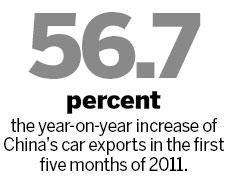
A man riding through an auto sales market in Beijing. Among the attributes Japanese engineers bring is an understanding of environmentally friendly cars, an area where Chinese carmakers aim to compete with international brands. [China Daily]
In 2009, the Chinese auto market overtook that of the United States to become the world's largest, but domestic vehicle makers have their sights set on something even bigger: a place in the ranks of global car leaders.
They want to compete with the likes of General Motors Co, Porsche AG and Toyota Motor Corp, but that's easier said than done, and it calls for hiring the right people managers, engineers and designers who have proven their worth, often at international companies.
In the past, Chinese vehicle makers looking to hire key talent would snap up big names hoping that these staff would live up to their reputations.
But China's auto industry has matured, and its executives want hefty returns on any investment in foreign staff.
The overseas market looks more attractive than ever, but it's challenging as well. During the first five months of 2011, China's car exports rose 56.7 percent year-on-year to 225,400 units.
With their growing foreign presence, Chinese vehicle makers have become more demanding in their hiring, both in terms of where staff come from and what their backgrounds are.
They always "prefer homegrown talent. Fellow East Asians come next because they fit in best with Chinese companies. Western experience is third or fourth on their list of priorities," says Gregory W. Noble, professor at the Institute of Social Sciences at the University of Tokyo.
Cultural affinities lead many Chinese vehicle makers to prefer professionals from Japan and South Korea over Westerners, he said.
Chinese auto companies have plenty of well-educated mainland engineers to choose from, but few of these candidates have project-management experience, Noble said.
"This is a desire for experience, not necessarily qualifications," Noble explained. Without solid project-management experience, even the best-trained engineers and designers won't necessarily produce the best cars.
Many experienced Japanese engineers, meanwhile, welcome the chance to work in China and increase their savings after retiring in Japan.
Two companies - Anhui Jianghuai Automobile Co and Chang'an Automobile Group Co - have sought Japanese talent and engineering experience.
Jianghuai Auto's search for seasoned Japanese engineers began as early as 2006, while Chang'an started signing up Japanese engineers in 2010.
Among the attributes the Japanese engineers bring is an understanding of environmentally friendly cars, an area where Chinese carmakers aim to compete with international brands.
Going green is part of a larger strategy to enter new markets, says Jianghuai Auto's Tokyo recruiting and research center head, Wang Wenjun. The fact that Japanese engineers are tried and tested hands in producing green vehicles makes them sought-after candidates.
 They are also known to have a better understanding of Chinese auto companies than Westerners.
They are also known to have a better understanding of Chinese auto companies than Westerners.
Foreign engineers also bring a wide range of technological knowledge, which is valuable to Chinese vehicle producers.
For example, Chang'an, a major player in the Chinese auto industry, has grown in experience and strength thanks to knowledge acquired through joint ventures with top global vehicle makers such as Ford Motor Co, PSA Peugeot Citroen SA and Suzuki Motor Corp.
Chang'an is setting up foreign subsidiaries to enable its foreign experts to work in several environments. One such operation is in Italy, where European designers and engineers work alongside Chinese employees.
This kind of arrangement allows Chinese staff to learn international best practices.
These subsidiaries, Noble said, are "windows to the outside world" that provide a fusion of working methods and cultures.





